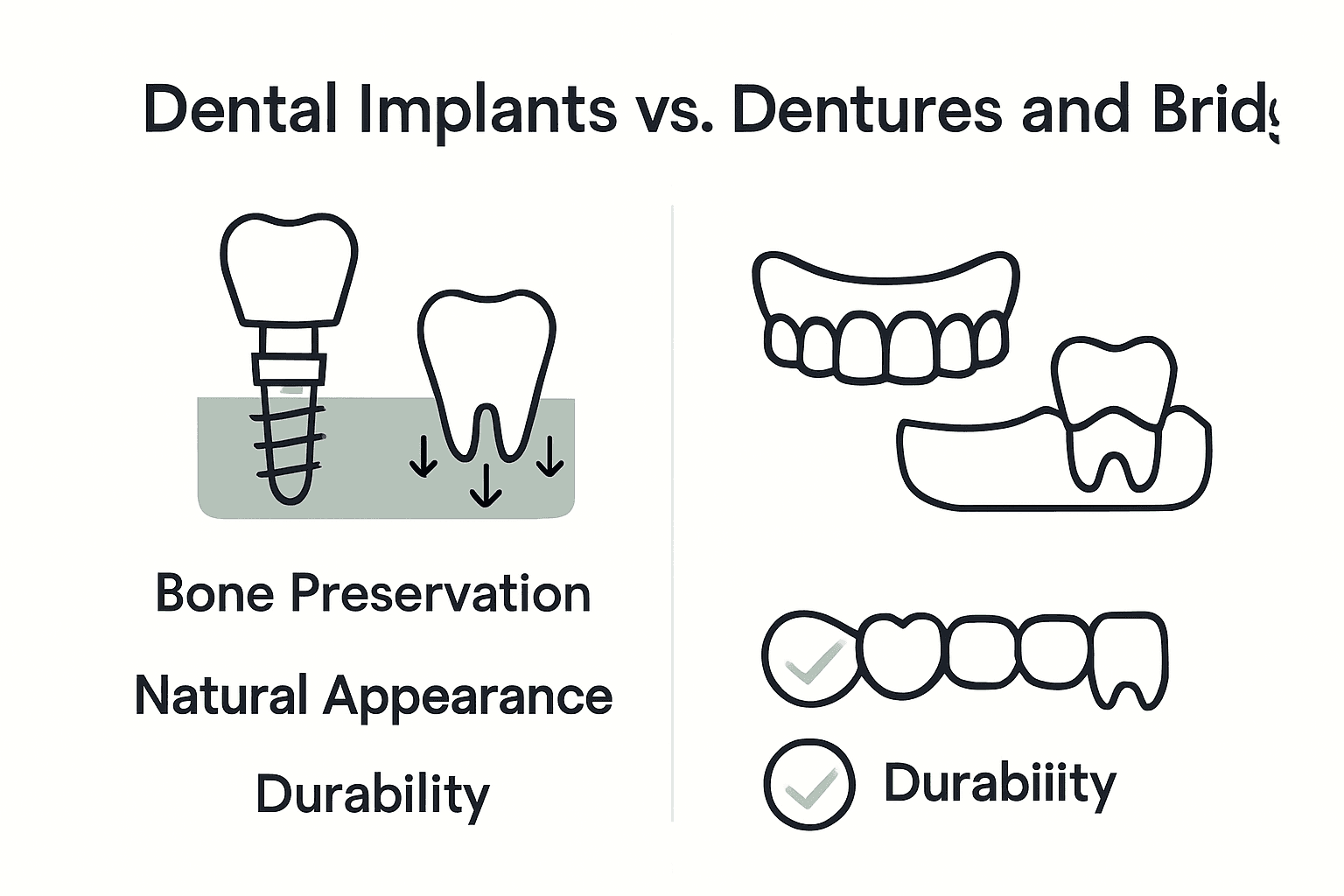Every year, more than three million american adults choose dental implants to replace missing teeth and regain confidence in their smiles. Tooth loss can affect everything from daily comfort to long-term health, making a stable and natural-looking solution a top priority. Understanding how dental implants work can help you decide if this modern approach to tooth replacement fits your needs, giving you clearer insight into the science and life-changing benefits behind this popular choice.
Table of Contents
- What Are Dental Implants And How They Work
- Types Of Dental Implants And Key Differences
- Major Benefits Over Other Tooth Replacements
- Dental Implant Procedure: Steps And Expectations
- Risks, Costs, And Recovery Considerations
Key Takeaways
| Point | Details |
|---|---|
| Dental Implants Functionality | Dental implants replace missing teeth with a titanium post, abutment, and custom crown, integrating directly into the jawbone for stability. |
| Types of Implants | Options include endosteal, subperiosteal, All-on-4, and mini implants, tailored to individual patient needs and bone structure. |
| Advantages Over Alternatives | Implants offer a natural appearance, preserve surrounding teeth, boost chewing function, and prevent bone loss compared to dentures and bridges. |
| Cost and Considerations | Implant procedures vary in cost from $1,500 to $6,000, with recovery timelines of 3-6 months and risks such as infection and nerve damage needing careful evaluation. |
What Are Dental Implants and How They Work
Dental implants are sophisticated medical devices designed to replace missing teeth and restore both functionality and aesthetics to your smile. According to Hopkins Medicine, these innovative solutions consist of three primary components: a titanium post, an abutment, and a custom-designed crown.
The implantation process is a precise surgical procedure where the titanium post is strategically placed directly into the jawbone. This medical-grade titanium serves a remarkable purpose - it naturally integrates with the bone through a process called osseointegration. Over time, the post fuses with the surrounding bone tissue, creating an incredibly stable and permanent foundation for the artificial tooth. As FDA experts explain, this integration helps prevent bone loss and provides robust support for artificial teeth.

Unlike traditional removable dentures, dental implants offer a permanent solution that closely mimics natural teeth. The procedure involves several key stages:
- Initial dental evaluation and imaging
- Surgical placement of the titanium post
- Healing and bone integration period
- Attachment of the custom abutment
- Placement of the final crown
Patients can expect a comprehensive transformation that not only improves their smile but also restores full chewing functionality and prevents potential long-term dental complications. For a deeper understanding of the different types of implants available, check out our comprehensive guide on dental implant types.
Types of Dental Implants and Key Differences
Dental implants are not a one-size-fits-all solution, but rather a sophisticated range of options tailored to individual patient needs. According to FDI World Dental, these medical devices are primarily constructed from titanium or titanium alloy and serve as artificial roots inserted directly into the jawbone to support various dental prostheses.
Material Variations play a crucial role in implant selection. Authority Dental highlights two primary materials: titanium and zirconia. Titanium implants are renowned for their durability and impressive success rates, making them the traditional choice for most dental professionals. Zirconia implants, in contrast, offer a more aesthetically pleasing option with their tooth-colored appearance, which can be particularly appealing for patients concerned about visual authenticity.
The primary types of dental implants include:
- Endosteal Implants: The most common type, surgically placed directly into the jawbone
- Subperiosteal Implants: Positioned on top of the bone but under the gum tissue
- All-on-4 Implants: A revolutionary technique supporting an entire arch of teeth with just four strategically placed implants
- Mini Implants: Smaller diameter implants used in situations with limited bone density
Patient selection depends on multiple factors including bone structure, overall oral health, and specific restoration goals. For a comprehensive exploration of dental implant terminology and nuanced differences, explore our complete dental implant terminology guide.
Major Benefits Over Other Tooth Replacements
Dental implants represent a groundbreaking advancement in tooth replacement technology, offering significant advantages over traditional solutions like bridges and dentures. According to Cleveland Clinic, these innovative prosthetics provide multiple transformative benefits, including improved chewing ability, enhanced smile aesthetics, and superior speech functionality.
Bone Preservation emerges as a critical advantage of dental implants. Columbia Dental emphasizes that implants uniquely stimulate and maintain bone growth, preventing the significant bone loss typically associated with tooth extraction. Unlike removable dentures or traditional bridges that sit on the gum surface, implants integrate directly into the jawbone, creating a stable foundation that mimics natural tooth roots.
Key benefits of dental implants compared to alternative tooth replacement options include:

- Natural Appearance: Virtually indistinguishable from original teeth
- Structural Integrity: Preserve surrounding teeth without requiring modification
- Durability: Potential to last decades with proper care
- Functional Performance: Restore full chewing and speaking capabilities
- Comfort: Eliminate the discomfort of removable prosthetics
For patients considering their tooth replacement options, understanding the nuanced advantages is crucial. Explore how dental implants compare to traditional bridges in our comprehensive guide comparing dental implants and bridges, which can help you make an informed decision about your oral health restoration strategy.
Dental Implant Procedure: Steps and Expectations
Dental implant surgery is a sophisticated multi-stage process that requires precision, expertise, and careful planning. According to Mayo Clinic, the comprehensive procedure typically involves several critical steps, including removal of damaged teeth, meticulous jawbone preparation, and strategic implant placement.
Surgical Precision is paramount in dental implant procedures. AAOMS explains that the surgery is performed by specialized oral and maxillofacial surgeons who follow a systematic approach. The process fundamentally involves inserting a titanium implant directly into the jawbone, allowing sufficient time for osseointegration - the critical biological process where the implant fuses with surrounding bone tissue.
The typical dental implant procedure follows these key stages:
- Initial comprehensive dental examination and imaging
- Damaged tooth extraction (if necessary)
- Potential bone grafting to ensure adequate jawbone density
- Titanium implant surgical placement
- Healing and bone integration period (3-6 months)
- Abutment attachment
- Custom prosthetic tooth placement
Patients considering dental implants should understand that individual experiences may vary. For a detailed walkthrough of surgical preparation, review our comprehensive guide on preparing for dental implant surgery, which provides crucial insights into what to expect during this transformative dental procedure.
Risks, Costs, and Recovery Considerations
Dental implant procedures, while highly successful, involve comprehensive considerations that patients must carefully evaluate. According to Cleveland Clinic, the procedure carries potential risks including infection, potential damage to surrounding teeth, nerve complications, and possible sinus-related issues that patients should thoroughly discuss with their dental professional.
Financial Investment plays a significant role in dental implant decision-making. Mayo Clinic highlights that implant costs vary dramatically based on multiple factors, including the number of implants required, complexity of the procedure, and any additional preparatory treatments like bone grafting. Patients should anticipate costs ranging from $1,500 to $6,000 per individual implant, depending on their specific clinical requirements.
Key potential risks and recovery considerations include:
- Surgical Risks: Infection, nerve damage, sinus complications
- Healing Timeline: Initial recovery within one week, complete integration up to 6 months
- Cost Factors: Number of implants, additional procedures, geographic location
- Long-Term Maintenance: Regular dental hygiene and professional check-ups
- Success Variables: Patient’s overall health, bone density, oral hygiene habits
Patients seeking a comprehensive understanding of potential challenges and financial planning should explore our detailed guide on dental implant preparation, which provides in-depth insights into managing expectations and making informed decisions about this transformative dental procedure.
Discover Your Best Smile with Expert Dental Implant Solutions
Missing teeth can affect more than just your appearance. From struggling to chew properly to feeling self-conscious about your smile, dental implants offer a powerful way to restore confidence and oral function. This article explains key implant types and benefits, helping you understand why a personalized treatment plan is essential for lasting results.
At DentalAteliers.com, led by Dr. Kunal Narang in Lynnwood WA, we specialize in implant dentistry tailored to your unique needs. Whether you are exploring options like All-on-4 implants or full-arch zirconia restorations, our patient-centered approach ensures comfort and expert care throughout. With detailed treatment plans and transparent pricing, we make the path to a healthier smile clear and accessible.

Ready to regain your natural smile with trusted dental implants? Visit DentalAteliers.com now to learn about our advanced procedures and book your first appointment. Take the first step toward effective, long-lasting tooth replacement that feels and functions like the real thing. Your new smile starts here.
Frequently Asked Questions
What are dental implants?
Dental implants are advanced medical devices used to replace missing teeth, consisting of a titanium post, abutment, and crown. They are surgically placed into the jawbone and integrate with bone tissue for stability.
What are the different types of dental implants?
The main types of dental implants include endosteal implants (placed in the jawbone), subperiosteal implants (positioned on top of the bone), All-on-4 implants (supporting an entire arch with four implants), and mini implants (smaller implants for limited bone density situations).
What are the benefits of dental implants over traditional dentures?
Dental implants offer numerous advantages including a natural appearance, improved chewing and speaking ability, prevention of bone loss, and durability that can last for decades, unlike traditional dentures that can be uncomfortable and require regular maintenance.
How much do dental implants typically cost?
The cost of dental implants can range from $1,500 to $6,000 per implant, depending on factors such as the number of implants needed, the complexity of the procedure, and any additional treatments like bone grafting.


.svg)